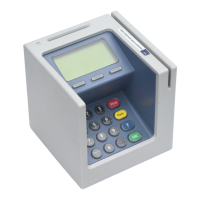
Do you have a question about the Banksys C-ZAM/XENTA and is the answer not in the manual?
| Brand | Banksys |
|---|---|
| Model | C-ZAM/XENTA |
| Category | Payment Terminal |
| Language | English |
Explains the SAMOA System-On-a-Chip as the core engine, including hardware and software components.
Highlights the terminal's leading security features, including tamper resistance and privacy shield.
Provides physical dimensions (131 x 132 x 132.5 mm) and weight (740 g) of the terminal.
Details the 19-key keypad, including numeric, command, and function keys, and backlight features.
Describes features like tactile identifiers, key shape differentiation, backlights, and ADA compliance for accessibility.
Details the LCD display (128x64 pixels, 6 lines, 20 chars/line) and its readability.
Describes the two card interfaces: EMV 4.0 Level 1 chip card and triple-track magnetic stripe reader.
Explains the 4 internal chip card interfaces (IDO) for CSM/SAM, supporting 3V and 5V CSMs.
Details the SAMOA ASIC's components: ARM cores, memory, RTC, Ethernet, encryption, RSA accelerator, and printer driver.
Describes the default interfaces: ECR (RS232), MU (RJ45), and LINE (PSTN).
Covers the rear reset button and the housing color specifications.
Details the universal tabletop adapter specifications (input/output voltage, current) and cable lengths.
Specifies operating temperature (0-50°C) and relative humidity (20-85%) for the terminal and accessories.
Lists the standards and certifications the terminal adheres to, including EMV, CE, Metlab, EMC, and telecommunication specs.
Details how the SAMOA ASIC achieves high security via tamper circuits, security memory, and secured boot process.
Explains physical security measures like the privacy shield and tamper detection mechanisms.
Describes supported key management schemes like DUKPT and Master/Session for secure transactions.
Lists security-related standards the terminal complies with, such as ISO 13491, ISO 9564, and ISO 15668.
Explains how interface boards add communication capabilities and describes the ISDN interface board.
Details specifications for the ISDN interface board, including protocols and communication speed.
Describes the GSM/GPRS/SMS interface board, its bands, SMS capability, and speeds.
Details the USB interface board for PC/ECR connection and its USB 2.0 compliance.
Mentions wireless LAN and short-range wireless solutions for dial-up services.
Describes the thermal graphic printer that attaches to the rear of the terminal.
Details printer dimensions (91x60x101mm), weight (275g), and connection.
Lists printer specs like paper refill, resolution, printing speed, and detections.
Specifies paper width (58mm) and length (25m), recommending Banksys approved paper.
States that environmental conditions for the printer are identical to those of the terminal.
Explains the merchant unit's function in facilitating operations, especially when not connected to ECR/PC.
Details merchant unit dimensions (91x228x68mm), weight (480g), keypad, display, and interface.
Lists the standards and certifications the merchant unit complies with, similar to the terminal.
Mentions power adapter connection and environmental conditions for the merchant unit.
Describes the fixation plate for attaching the terminal to a counter and its mounting methods.
Provides the dimensions of the fixation plate (132 x 131 x 31 mm).
Explains the swivel's purpose for easily turning the terminal towards the user in standalone configurations.
Provides the dimensions related to the swivel and fixation plate (16, 130 mm).
Describes the package design for the terminal and accessories, aiming for compact verification.
Specifies storage temperature (-25 to +70°C) and humidity (5-95%) for the terminal package.
Details the package for the merchant unit and its adapter, fitting the terminal's package size.
Describes bulk packages containing printers, interface boards, fixation plates, and swivels.